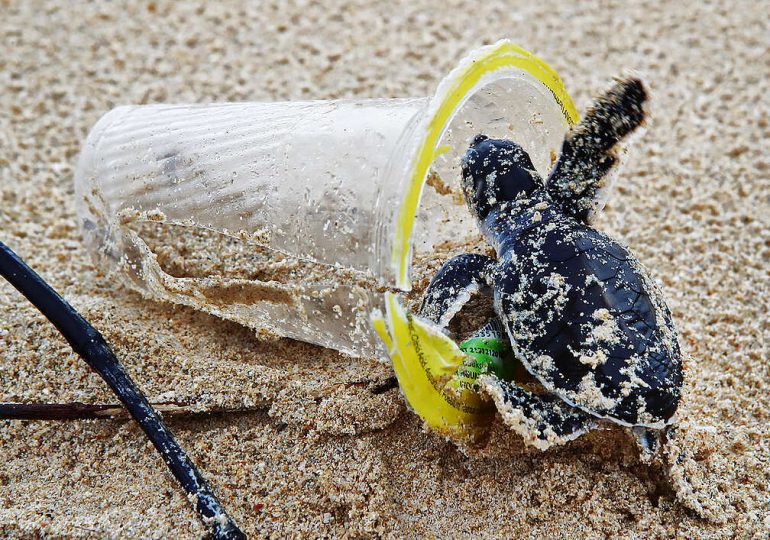Plastic pollution has flooded our planet. Pollution from plastics touches every corner of the globe reaching the deepest parts of our oceans,1 the highest mountain peaks2 and even contaminating our rainwater.3 Plastics harm multiple ecosystems at every stage of their life cycle, damaging people’s health, accelerating social injustice, destroying biodiversity and fuelling the climate crisis.
Strong public concern about the scale of the plastics problem4 led to the initiation of the Global Plastics Treaty in 2022, which included a mandate to address the full life cycle of plastic.5
The negotiations for the Global Plastics Treaty6 are a historic opportunity to achieve a comprehensive international response to the scale of the global plastics crisis by turning off the plastics tap and finally ending the age of plastic.
Why cut plastics production?
We cannot end plastic pollution without reducing the production of plastics.7 This could not be more urgent – the amount of plastic made by petrochemical corporations is increasing every year. More than half of all the plastics ever produced have been made since the year 2000, and if the industry has its way, plastic production could double within the next 10-15 years, and triple by 2050.8
Plastics are making the climate crisis worse – 99% of plastics are made from fossil fuels. The single-use plastics made in 2021 released greenhouse gas emissions equivalent to the total emissions of the entire United Kingdom, and most of these emissions come from plastic production.9 Therefore we cannot tackle the climate crisis, and reduce greenhouse gas emissions to align with the global target of 1.5°C, without reducing the production of plastic. Greenpeace is proposing that the Global Plastics Treaty establishes a target to reduce plastic production by at least 75% by 2040 (from a 2019 baseline10), to ensure the best chance of meeting the 1.5°C target, protect biodiversity and address the full life cycle impacts of plastic.
In the Global Plastics Treaty negotiations political leaders must have the courage to confront the fossil fuel industry and represent the will of the people to protect human health, the climate and biodiversity.
Executive summary
The results of this survey demonstrate that there is overwhelming public support for the Global Plastics Treaty to cut plastic production, end singleuse plastics and advance reuse-based solutions. Conducted in 19 countries with over 19,000 respondents, the survey shows strong support for cutting the production of plastic, at over 8 in 10 people (82%11), and for protecting biodiversity and the climate by cutting plastics production (at 80%11). As many as 9 out of 10 people (90%12) support a transition away from single-use plastic packaging to reusable and refillable packaging, while 75%11 support a ban on single-use plastic. Likewise, 80% of people are concerned13 about the impacts of plastic on the health of their loved ones and 84% of parents are concerned about these impacts on the health of their children.
The high level of support for ambitious action on plastics is similar across all the countries surveyed, but particularly strong in most of the Global South countries where plastic pollution levels are higher. Support for all the statements was well above 50%, with the lowest percentage still at 60%,11 in support of a statement that lobbyists from the fossil fuel industry and chemical industries should not be allowed to take part in negotiations, for the Global Plastics Treaty to be successful.
The overwhelming show of public support sends a strong message to the Goverments negotiating the Global Plastics Treaty – the public expects political leaders to address pollution from the full life cycle of plastics, by cutting plastic production and banning single-use plastics. A failure to do so will carry political consequences.
Global Plastics Treaty
Single-use plastic is harmful to human health, perpetuates social injustice, destroys our biodiversity and fuels the climate crisis. We demand that governments commit to a strong Global Plastics Treaty that will stop runaway plastic production and use and ultimately end the age of plastic.
1 Sanae Chiba S. et.al., (2018), Human footprint in the abyss: 30 year records of deep-sea plastic debris, Marine Policy, Volume 96, 2018, Pages 204-212, ISSN 0308-597X, https://doi.org/10.1016/j.marpol.2018.03.022. https://www.sciencedirect.com/science/article/pii/S0308597X17305195#!
2 Napper I.E. et.al. (2020), Reaching New Heights in Plastic Pollution—Preliminary Findings of Microplastics on Mount Everest, 50 One Earth Volume 3, Issue 5, P621-630, November 20, 2020. https://www.cell.com/one-earth/fulltext/S2590-3322(20)30550- 9?_returnURL=https%3A%2F%2Flinkinghub.elsevier. com%2Fretrieve%2Fpii%2FS2590332220305509%3Fshowall%3Dtrue
3 Fleming, S. (2020), Scientists find plastic pollution in the rain and in the air we breathe, World Economic Forum, 31st July 2020; https://www.weforum.org/agenda/2020/07/ scientists-find-plastic-pollution-in-the-rain-and-in-the-air-we-breathe/
4 More than two million people signed a petition supporting a Global Plastics Treaty; greenpeace.org/PlasticsTreaty
5 The United Nations Environment Assembly adopted UNEA Resolution 5/14 in March 2022
6 The fourth meeting of the Intergovernmental Negotiating Committee Global Plastics Treaty (INC-4) will take place at the end of April 2024 in Ottawa, Canada. UN Environment Programme, Intergovernmental Commission on Plastic Pollution, Fourth Session (INC-4); https://www.unep. org/inc-plastic-pollution/session-4
7 European Academies Science Advisory Council (EASAC) (2024), Update on the EASAC Plastics Report: Towards a Plastics Treaty, 1 February 2024; https://easac.eu/publications/details/update-on-the-easac-plastics-report-towards-a-plastics-treaty
GRID-Arendal (2024). Climate impacts of plastics: Global actions to stem climate change and end plastic pollution. Norway; https://gridarendal-website-live.s3.amazonaws.com/production/documents/:s_document/1076/ original/ClimateImpactsOfPlastics.pdf?1709631241
CIEL (2023), Reducing plastic production to achieve climate goals; key considerations for climate negotiations, September 2023; https://www.ciel.org/ wp-content/uploads/2023/09/Reducing-Plastic-Production-to-Achieve-Climate-Goals_Sept21_V5.pdf
Numerous scientists: Cirino et.al. (2023), Assessing benefits and risks of incorporating plastic waste in construction materials, Front. Built Environ., 05 July 2023, Sec. Sustainable Design and Construction, Volume 9 – 2023 | https://doi.org/10.3389/fbuil.2023.1206474; SCIENCE (2022), Letter – A global Plastics Treaty must cap production, 28 Apr 2022, Vol 376, Issue 6592, pp. 469-470, DOI: 10.1126/science.abq0082; and reports, including, for example, the Economist Impact /Nippon Foundation, Peak plastics: bending the overconsumption curve https://backtoblueinitiative. com/plastics-consumption/; Landrigan et.al. (2023), The Minderoo-Monaco Commission on Plastics and Human Health. Annals of Global Health, 89(1), p.23.DOI: https://doi.org/10.5334/aogh.4056 (supported by Landrigan (2023), The Global Plastics Treaty, why is it needed, The Lancet medical journal, Published: 17, 2023 DOI: https://doi.org/10.1016/S0140- 6736(23)02198-0), and more.
8 World Economic Forum (2016), The New Plastics Economy: Rethinking the future of plastics, January 2016; http://www3.weforum.org/docs/WEF_The_ New_Plastics_Economy.pdf
9 Minderoo Foundation. Plastic Waste Makers Index 2023.
10 Production of 2019: 460 MMT in: Pacific Environment, Stemming the Plastic-Climate Crisis; https://www.pacificenvironment.org/wp-content/ uploads/2023/05/Stemming-the-Plastic-Climate-Crisis-1.pdf
Greenpeace International (2023) Why Greenpeace is calling on governments to cut plastic production by at least 75% by 2040, 10 October 2023; https://www.greenpeace.org/international/story/62928/why-greenpeace-is-calling-on-governments-to-cut-plastic-production-by-at-least-75-by-2040/
Greenpeace International (2023), Brief: Establishing a global plastic production target in line with 1.5°C; https://docs.google.com/ document/d/1rjb0-M0nNIIztUQcoMab301f7pvn3Wd-tI38lqkk9us/ edit?usp=sharing
11 ‘Strongly agree’ and ‘Somewhat agree’ responses combined
12 ‘Essential’, ‘Very important’, and ‘Fairly important’ responses combined
13 ‘Very concerned’ and ‘Somewhat concerned’ responses combined
14 Censuswide abides by and employs members of the Market Research Society and follows the MRS code of conduct and ESOMAR principles Censuswide is also a member of the British Polling Council.






